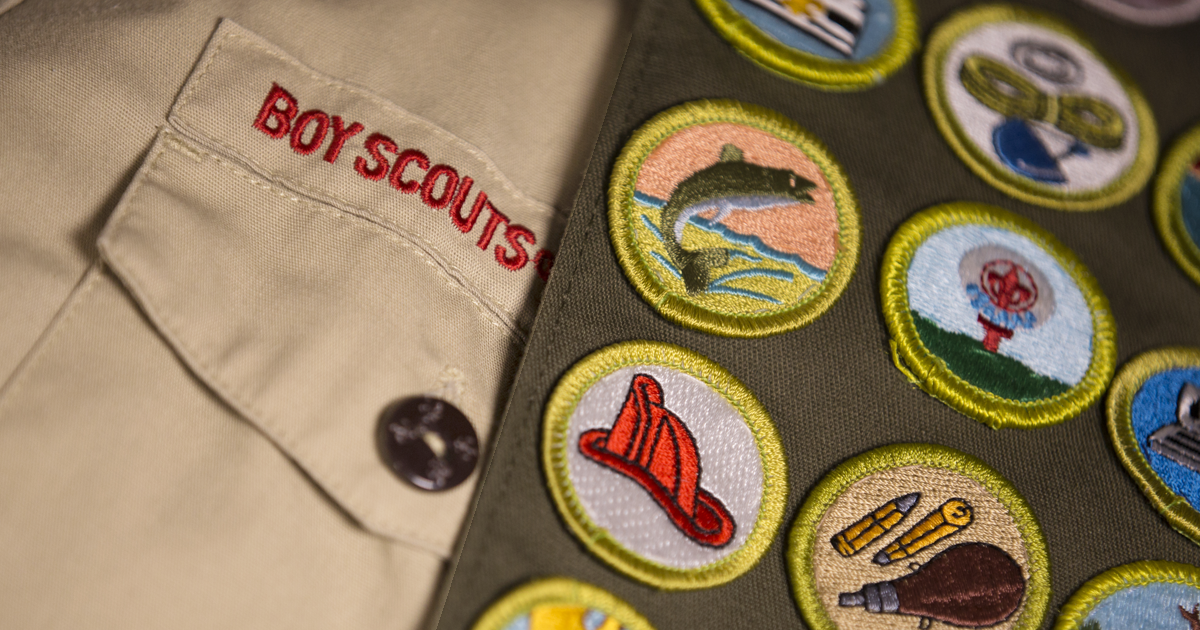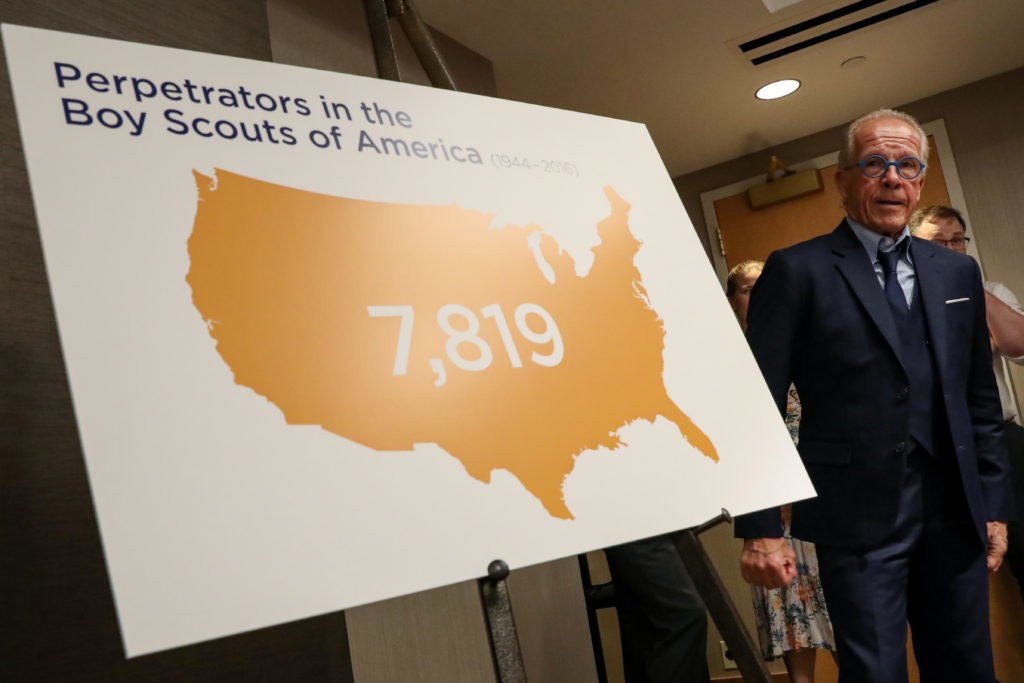Filed under: Anti-Patriarchy, Editorials, Featured, Queer, Tranarchy, Trans

 rior to becoming the transfeminine anarchist rascal that I am today, I was a Cub Scout.
rior to becoming the transfeminine anarchist rascal that I am today, I was a Cub Scout.
Although my fervor for scouting was certainly present when I joined the grade school division of the Boy Scouts of America, my enthusiasm would dwindle over time, leading to my decision to quit before middle school started.
It’s enjoyable to reminisce about this stage of life with other LGBTQ folks. For myself anyway, it’s a funny way to work through queer pain. A friend of mine, a gay dude who spent six years as a Scout, has at various points told me that he now looks back at his experiences through a campy lens; the khakis and neckerchiefs, the theatricality of various Scout ceremonies, the crafts, and the boys’ campfires, it all seems to contradict the BSA’s hyper-masculine molding efforts and aversion to gayness.
But I digress. The Boy Scouts have a strained relationship with queer communities, largely due to their history of excluding us from their programs. They snatched headlines awhile back for lifting their bans on openly-gay Scouts and leaders, and more recently, for their decision to allow trans boys.
I’m not just writing this to recount the evolution of BSA policies, and I’m definitely not trying to present a case for the organization’s progressiveness. In my view, the group has operated as an agent of gender warfare, religious domination, and sexual hegemony since its founding – and it is crucial to examine why they look like they do now.
Priming young minds for the machinery of oppression
As the organization’s proponents will often tout, BSA programs can lead kids toward careers as soldiers and cops. Bryan Wendell, an Eagle Scout and Scouting Magazine contributor, wrote in a 2017 blog entry that “Scouts who enter our nation’s military academies find themselves with a leg up on their classmates. Leadership, patriotism and service? Those are characteristics Scouts are known for.”
“No surprise, then,” he continued, “that student applications from cadets and midshipmen at U.S. military academies reveal an impressive number of Eagle Scouts and former Scouts.” He goes on, in the article, to expound upon the sizable representation of Scouts at US Military academies, citing various enrollment statistics that prove his point.
Wendell’s notion that the BSA’s values encourage participation in the military is correct. However, in my humble opinion, persuading young people to pursue an occupation which would have them risk their lives serving imperialism is actually incredibly shitty.
One could surmise that similar trends might be found in the field of law enforcement, but it’s hard to say given the lack of available data. What we do know is that the Boy Scouts have churned out multiple FBI directors, that the DEA provides an anti-drug “Red Ribbon Patch” to Scouts each year as part of a week-long national campaign, and that since the ‘70s, the BSA has had a Law Enforcement Exploring program wherein teen Scouts work with their local cops as training for future career paths. Based on all this, I think it’s fair to say that the Boy Scouts advocate policing as a valuable public service.
The police and the military represent invasion, occupation, and hierarchy. The US Armed Forces serve the interests of the ruling class through intervention in foreign nations, while domestic law enforcement agencies repress our nation’s deprived and racialized communities in a similar fashion.
The Boy Scouts endorsement of these oppressive bodies should be placed within a wider context of its long-held objectives. Robert Baden-Powell was a Lieutenant-General of the British Army, celebrated for his efforts during the Second Boer War – an event which saw brutal colonialist domination on the part of the United Kingdom. After retiring from the military in 1910, he ushered in the worldwide Boy Scout movement.
In the 1930s, Baden-Powell also displayed a liking for fascism. He was an early admirer of Benito Mussolini and his youth organization Opera Nazionale Balilla, and called Mein Kampf a “wonderful book”.
His mindset amounts to the ideological origins of groups like the Boy Scouts of America, whose piggish affiliations I’ve already mentioned.
Aside from being associated with repressive institutions, the Boy Scouts are, arguably, a formidably-repressive institution themselves; indeed, the BSA has a lot in common with their friends in blue and camouflage; such as rampant under-reported sexual misconduct.
Assault & authority
CW: Discussion of sexual assault
For decades, the Boy Scouts have dealt with scandals regarding sexual assault. Their problem now appears much more dire, with hundreds of new reports of abuse coming to the forefront on August 5th. One man filed suit in Philadelphia, alleging five years of molestation by an assistant scoutmaster.
#Pueblo boy scouts volunteer faces child sexual assault charges. http://t.co/5RMVUHX2
— KOAA News5 (@KOAA) December 2, 2011
Like the military or the police, the BSA strongly values authority. This is interconnected with the heteropatriarchal framework of the organization – rigid hierarchy, respect for anyone or anything that is placed above yourself, and obsession with perceived merit are all correlated to the implicit toxic masculinity of the institution.
Given this condition, the abuse and exploitation of subordinates (young Scouts) by their leaders (adult scoutmasters) could be seen as inevitable.
#Breaking: More sexual assault charges filed against former Boy Scouts volunteer: https://t.co/gnuM50x4H4 pic.twitter.com/GLnp52rHZS
— WPRI 12 (@wpri12) March 6, 2019
So while a culture of blind respect for authority (along with oversights leading to abusers being allowed in leadership roles) enables the assault of Scouts, masculine anxiety and fear of vulnerability prevent victims from coming forward.
According to the Association of Alberta Sexual Assault Services, “Most guys who experience sexual assault choose never to reveal it, even to people they know and trust. They fear being disbelieved, ridiculed, shamed, accused of weakness, ignored or, in the case of heterosexual men, being perceived as gay.”
Boy Scouts failed to stop hundreds of previously unreported sexual predators, a lawsuit alleges.
Charges: Negligence/Conspiracy to keep incidents of sexual assault a secret, “reckless misconduct” in failing to protect its young participants. https://t.co/TGz5kuGoPz— Common Conversation (@dianaaitchison) August 6, 2019
From a young age, those assigned male at birth are taught that they must be strong, and unshaken by emotional distress. This message was instilled in me implicitly and explicitly through media, through schooling, and indeed, through scouting. There are twelve points in the Scout Law, and not a single one effectively promotes self-compassion or emotional education.
It seems to me that when values like “Reverence” and “Obedience” (both of which are points in the Scout Law) are more fiercely-evangelized within a major youth organization than self-care and personal growth, the result will be masses of adolescents who are unable to cope with vulnerability, or who go decades without disclosing their pain, or who allow themselves to be conducted by strongmen, or who unconsciously fall victim to rigid societal expectations.
Moral straightness & the Mormons
“Moral straightness” is a concept that confused me a lot as a Scout, and continues to puzzle me.
The Scout Oath reads: “On my honor I will do my best to do my duty to God and my country and to obey the Scout Law; to help other people at all times; to keep myself physically strong, mentally awake, and morally straight.” That last item has been interpreted in a plethora of ways, notably to defend the BSA’s homophobic policies.
Not too long ago, the official stance was “Boy Scouts of America believes that homosexual conduct is inconsistent with the obligations in the Scout Oath and Scout Law to be morally straight and clean in thought, word, and deed.” The most likely reason for the Scouts’ history of discrimination is their legacied alliance with the Mormon Church.
The Church of Latter Day Saints (the Mormons) was the first partner of Scouting in the United States, and for years, they were their top sponsor – in 2013, they made up over 430,000 total youth in the Scouts, more than any other church.
The bigotry of the Mormon Church is notorious. They were among the fiercest opponents to the legalization of same-sex marriage in years prior to Obergefell v. Hodges. Interestingly enough, the Church voiced support for the Boy Scouts’ decision to end their ban on gay youth in 2012.
Despite so-called evolution on LGBTQ issues, for much of the 20th century, the Mormons were unambiguously-homophobic. During the “Lavender scare” of the 1950s, Apostle J. Reuben Clark warned of the threat homosexuality posed to general wellbeing, suggesting “the homosexuals are today exercising great influence in shaping our art, literature, music, and drama.” He was obviously correct in this regard, but where he saw wretched cultural infestation, I see glorious camp.
The vilest of homophobia would remain a feature of the LDS Church in the decades following, with the infrequently-published For the Strength of Youth pamphlet seeing its first outright reference to the abomination of same-gender affections in its 1990 edition.
This is what they mean by “moral straightness.” The Mormons have left an enduring and repugnant mark on American scouting.
The present and future of the Scouts
The Mormons are breaking up with the Boy Scouts. By the end of this year, they won’t be sponsoring any BSA programming. This apparently-amicable split coincides with the Scouts’ newsmaking choice to start scouting groups for girls.
Despite what you may have heard, or what you may believe, the Scouts are not becoming “gender neutral.” Yes, they changed their name to Scouts BSA to reflect their choice to welcome girls into programs. But it is clear that the Scouts will still be heavily-gendered, and that boys and girls will be separated.

Attorney Jeff Anderson speaks during a news conference accusing the Boy Scouts of America of harboring thousands of sexual abusers in New York, U.S., April 23, 2019. REUTERS/Brendan McDermid
The Scouts, flatly-uncaring for gender-expansive youth, would like to present a progressive facade. To some, their decision to allow girls (who, again, will not be scouting alongside boys) is a shocking leap forward, indicating a grim feminist future where all manhood or boyhood is eviscerated; this reaction gives the BSA far too much credit. Not only will the Scouts continue to enforce a distinct and divided gender binary, but there will be no addressing or confronting of their virulent affiliations with patriarchal coteries like our nation’s cops and imperial forces.
The BSA’s executive committee is, and always has been, mostly white men. Even if the Scouts were to include all genders, intermingling in the same dens and troops, a lot would stay exactly the same, as would the hegemonic leadership.
Repression and control have been baked into the organization for over a century. An inclusive decoration can’t resolve that.








